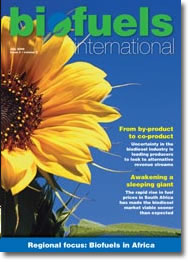
Volume 2, Issue 3
Published: July 1, 2008
Spoilt for choice
Looking back at EU feedstock use throughout 2007, it is clear that unlike other continents, Europe is everything but a biofuels monoculture
...
Committing to carbon credits
A corporation's need to participate in the carbon markets comes from image preservation - failure to participate may have an adverse impact on the company's bottom line as well as share price
...
Awakening a sleeping giant
The rapid rise in fuel prices in South Africa has made the biodiesel market viable sooner than expected, explains Colin Crabtree, general manager at Sato Biodiesel
...
Biodiesel grows up
Feedstock flexibility and availability are not the only considerations when building a biodiesel plant
...
Threat or opportunity?
The term food-versus-fuel has become something of a cliché now, a convenient alliteration that rolls off the tongue. A cliché it may be, but one that can hardly have stronger meaning than it does...
Rotterdam or anywhere?
Europe's largest centre for petroleum products was host to the first Biofuels International expo & conference in June
...
The black art of trading biofuels
Unlike the vertical integration model common in the petroleum industry, the biofuels market is more disparate. With the exception of blending, all other aspects of the production chain are usually carried...
From by-product to co-product
Biodiesel producers are no longer scratching their heads over the question of what to do with glycerine, but looking at ways to make the most of its multi-market appeal
...
Green dreams
The answer to nearly every biofuels sustainability question at the moment is second generation biofuels. But are they a viable option and how long will the market have to wait? Brian Warshaw takes a look...
BTL biocrude
The number of biocrude projects has increased rapidly over recent months as petroleum companies seek to integrate biomass into existing petrol infrastructure
...
Cost savings using NIR
A monitoring programme is one of the easiest ways of cutting costs during production
...
Satisfying strict criteria
Standards exist to provide stability, yet sometimes they need to change to suit new circumstances. Without fuel standards for biofuels, engine design would be almost impossible
...
Quality time: When does it equal more than money?
By being able to receive faster test results during plant commissioning, companies are able to save both time and expense
...
The need for accurate blends
In a published paper on biodiesel blend quality submitted by the National Renewable Energy Laboratory1 in the US, the chief problem found was inaccurate blend ratios
...
New blends drive flexible equipment
Blending recipes for biofuels are fairly similar throughout the industry but as companies create more diverse proprietary flex-fuels for special applications, assuring consistent long-term product quality...










